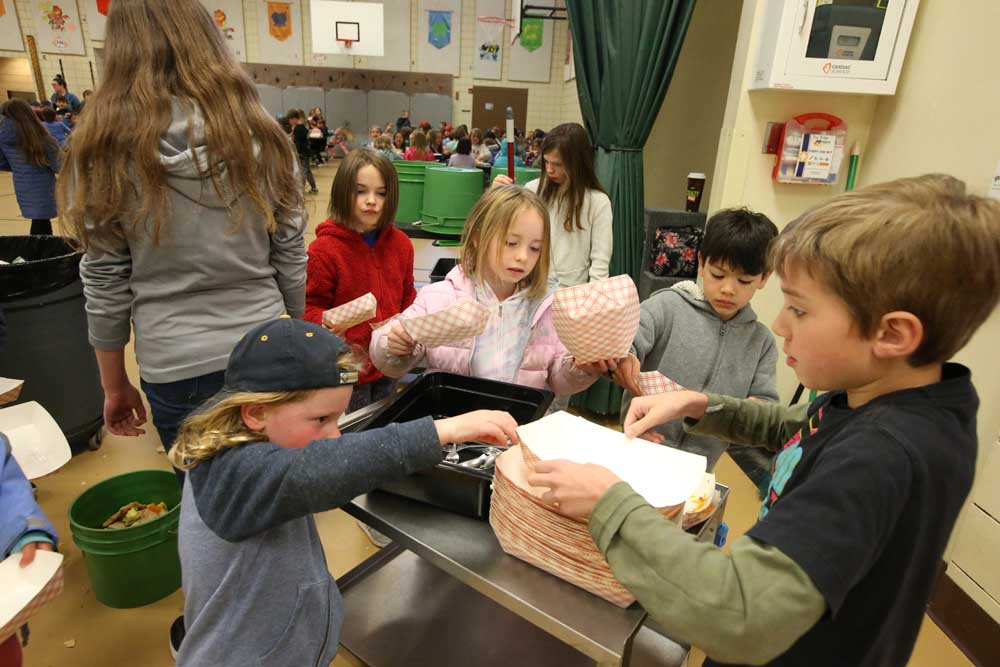Pine Ridge Elementary’s Green Team composts food scraps into usable soil
Published 5:45 am Saturday, May 4, 2024

- To minimize the amount of waste, Green Team member Conrad Carmichael, a fourth-grader, right, stacks paper serving containers from kindergartners after their lunch, before placing them in the garbage at Pine Ridge Elementary School in Bend on Tuesday morning.
Jackson Smith, a fifth grader at Pine Ridge Elementary School, collected a mop and a cleaning pad before helping to clean the floor of the school lunchroom after the kindergartners ate lunch Friday.
As a member of the school’s Green Team, it’s a job he takes seriously.
Like his fellow team members, he cares about the environment and wants to help reduce waste, keep the school in southwest Bend clean and ensure that food scraps can be composted into useable soil. The Green Team, which has 75 to 80 members, is open to fourth and fifth graders.
As Jackson worked, fellow members of the Green Team watched over buckets for food scraps and a trash can, making sure students leaving the lunchroom didn’t put anything in the wrong container.
Green Team members repeat this routine every day for all three lunch periods, ensuring students don’t throw away food that can be composted and that the room is clean for the next group, said Alicia Deaderick, Pine Ridge’s counselor and Green Team adviser.
“When we first started, there were just buckets after lunch,” Deaderick said. “And now, each grade level, it’s 1½- to two buckets max that they fill up, so it’s really cool.”
Helping the environment
The Green Team at Pine Ridge has been in place for more than five years, and recently led a campaign for drivers to turn their engines off when idling to lower emissions. Last year, the school began its composting program, and Deaderick has definitely seen a difference in how much food waste is reduced at breakfast and lunch.
“We got it down to three trash bags now out of our lunch room. When we started, I think it was seven,” said Deaderick. Green Team members also help by stacking used cardboard-serving containers so they take up less space in the trash and helping clean the lunchroom, which doubles as the gym. Students also recently began recycling soft plastic and food pouches. They share information with other students and staff by making videos and posters.
Jackson likes that everyone on the team has a job to do.
“I do kitchen two days a week. I’ve done it ever since the first day of school,” said Jackson. “You basically just watch people and make sure they don’t put trash in the food bin where compost goes, and wipe off the tables and help the adults that are working…And somehow we manage by ourselves to get half of an entire gym cleaned up in five minutes before physical education starts.”
Fourth grader Jace Capell, 10, likes being part of the Green Team so he can help reduce the world’s trash and help Pine Ridge. He helps with the composting and cleaning in the lunchroom.
Fifth grader Bennett Duval, 11, said: “Everyone’s always respectful and responsible and it helps the environment a lot. I like that it helps because we can fit more (containers) in our trash can.”
Jackson described how the food scraps are turned into compost, while Bennett added that the created soil is actually better than most soils and helps worms.
“Food scraps normally take two weeks to compost down, while other things, forever, hundred thousand years. It’s just crazy,” Jackson said.
Nearly a decade of composting
Bend-La Pine Schools serves 11,700 meals for breakfast and lunch on a daily basis. The district sends over 5,000 pounds of food waste weekly to Knott Landfill for commercial composting.
Though composting has been done in the district for nearly a decade, Bend-La Pine ramped up its efforts with the 2021 sustainability plan, said Jackie Wilson, the district’s sustainability coordinator.
“We’d really just been pushing for more of it; the kids really want to see it, I know, as well as a lot of the staff,” said Wilson. “Then it’s just getting everyone on board. OK, if you believe in it, then let’s educate our kids, let’s make sure they go into the lunchroom doing the things right.”
Last summer, the district overhauled its waste bins at school sites, making sure it had the right sizes. That work netted some extra funds so more schools could compost. Food waste is now collected and composted at 11 of 33 schools. Highland Magnet at Kenwood School is looking to start soon, said Wilson.
After a school expresses interest in composting, custodial staff and the administration need to be willing to try it out, said Wilson. After that, the school’s Green Team gets involved to perform a waste audit. Students bring their food scraps to a large table, and team members separate out entrees, vegetables and whole fruits.
The waste audit shows how much food waste a school is creating. The Green Team then educates staff and students on how they can improve, and begins composting.
Wilson’s focus is on how climate change can be mitigated and what kids should know about nutrition services so they respect the work that goes into the food they eat.
There isn’t on-site composting in schools, so Republic Services and Cascade Disposal bring the scraps to the landfill. When done on a commercial level, food breaks down so quickly that any food scraps can go in, unlike what might be done at home. The landfill sells the compost to farmers so they can mix it into soil beds.
“If one thing we can do is keep food waste out of the landfill, that’s something we can do for climate change,” said Wilson.
Think kids are on social media too early? Two Bend-La Pine Schools parents agree






